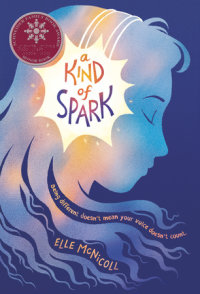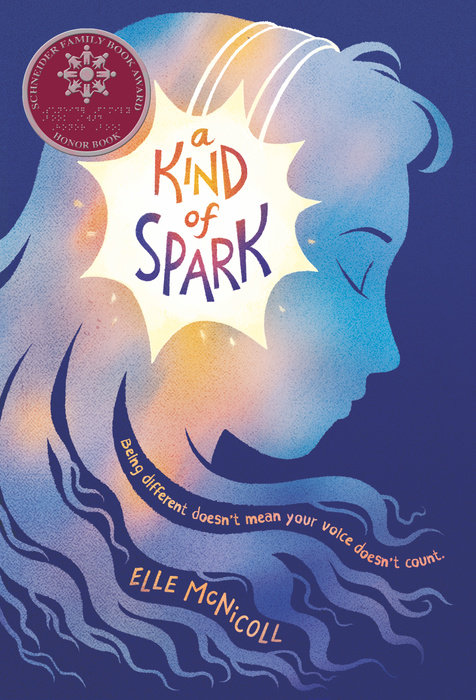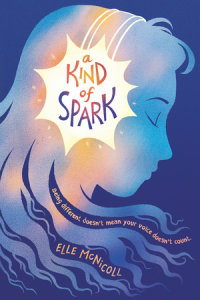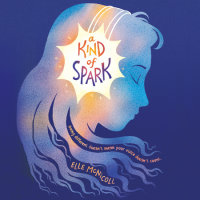A Kind of Spark
Perfect for readers of Song for a Whale and Counting by 7s, a neurodivergent girl campaigns for a memorial when she learns that her small Scottish town used to burn witches simply because they were different.
"A must-read for students and adults alike." -School Library Journal, Starred Review
Ever since Ms. Murphy told us about the witch trials that happened centuries ago right here in Juniper, I can’t stop thinking about them. Those people weren’t magic. They were like me. Different like me.
I’m autistic. I see things that others do not. I hear sounds that they can ignore. And sometimes I feel things all at once. I think about the witches, with no one to speak for them. Not everyone in our small town understands. But if I keep trying, maybe someone will. I won’t let the witches be forgotten. Because there is more to their story. Just like there is more to mine.
Award-winning and neurodivergent author Elle McNicoll delivers an insightful and stirring debut about the European witch trials and a girl who refuses to relent in the fight for what she knows is right.
An Excerpt fromA Kind of Spark
1
“This handwriting is utterly disgraceful.”
I hear the words, but they seem far away. As if they are being shouted through a wall. I continue to stare at the piece of paper in front of me. I can read it. I can make out every word, even through the blurriness of tears. I feel everyone in the classroom watching me. My best friend. Her new friend. The new girl. Some of the boys are laughing.
I just keep staring at my writing. Then, suddenly, it’s gone.
Ms. Murphy has snatched it from my desk and is now ripping it up. The sound of the paper being torn is overly loud. Right in my ears. The characters in the story I was writing beg her to stop, but she doesn’t. She crumples it all together and throws it toward the classroom bin. She misses. My story lies in a heap on the scratchy carpet.
“Do not ever write so lazily again!” she shouts.
Maybe she isn’t even shouting, but it feels that way. “Do you hear me, Adeline?” I prefer being called Addie. “Not ever. A girl your age knows better than to write like that; your handwriting is like a baby’s.”
I wish my sister were here. Keedie always explains the things that I cannot control or explain for myself. She makes sense of them. She understands.
“Tell me that you understand!”
Her shouts are so loud and the moments after are so quiet. I nod shakily. Even though I don’t understand. I just know it’s what I’m supposed to do.
She says nothing more. She moves to the front of the class and I am left alone. I can feel the new girl glancing at me, and my friend Jenna is whispering to her new friend, Emily.
We were supposed to have Mrs. Bright this year; we met her briefly before the summer holidays. She would draw a little sun with a smiling face beside her name and would hold your hand if you looked nervous. But she got sick and Ms. Murphy came to teach our class instead.
I thought this new school year would be better. That I would be better.
I take out my pocket thesaurus. It was a Christmas present from Keedie. She knows how much I love using different words, and we laughed because the word “thesaurus” sounds like a dinosaur. I read different word combinations to calm down, to process the shouting and the ripping.
I find a word that I like. “Diminished.”
On days like this, I spend lunchtime in the library. I feel the other children in the class still watching me as we tuck in our chairs and leave the room, the school bell screeching so loudly. Loud noises make my head spin; they feel like a drill against a sensitive nerve. I walk through the corridors, practicing my breathing and keeping my eyes straight ahead. People talk so loudly to their friends, who are right next to them. They get too close, they push and clamor, and it makes my neck hot and my heart too quick.
But when I finally get to the library it’s all quiet. A good kind of quiet. There is so much space, and an open window lets in a little fresh air. There is no loud talking allowed. The books are all categorized and labeled in their proper places.
And Mr. Allison is at his desk. “Addie!”
He has curly dark hair and big glasses, and he is tall and skinny for a man. He wears old sweaters. If I were to use my thesaurus to describe Mr. Allison, I would say he is kindly.
But I like to just say that he is nice. Because he is. My brain is very visual. I see everything in specific pictures, and when people use the word “nice,” I think of Mr. Allison, the librarian.
“I have just the thing for you!”
I like that he never asks boring questions. He doesn’t ask how my holidays were or how my sisters are doing. He just gets straight to talking about books.
“Here we go.” He walks over to one of the reading tables and puts a large hardcover book down in front of me. I feel all the horrid feelings from earlier disappear.
“Sharks!”
I flip it open immediately and stroke the first glossy page. I told Mr. Allison last year that I love sharks. That they are the most interesting thing to me, even more than the ancient Egyptians and the dinosaurs.
He remembered.
“It’s a sort of encyclopedia,” he tells me, as I sit down with the book. “An encyclopedia is a book that tells you a lot about one subject, or one area of study. This one is all about sharks.”
I nod, somewhat dazed from excitement.
“I suspect you know everything that’s in there already, though,” he says, and he laughs after he says it so I know that he’s joking.
“Sharks don’t have bones,” I tell him, caressing the photograph of what I know is a blue shark. “And they have six senses. Not five. They can sort of sense electricity in the atmosphere. The electricity of life! They can also smell blood from miles away.”
Their senses are sometimes overpowering. Too loud, too strong, too much of everything.
I turn the page to a large photograph of a solitary Greenland shark, swimming alone in the ice-cold water.
“People don’t understand them.” I touch the shark’s fin. “They hate them, actually. A lot of people. They’re afraid of them and don’t understand them. So they try to hurt them.”
Mr. Allison doesn’t say anything for a while, as I read the first page.
“You take that home with you for as long as you like, Addie.”
I look up at him. He is smiling, but his eyes don’t match his mouth.
“Thank you!” I make sure to put all the glad that I am feeling into my voice so that he knows I really mean it. He moves back to his desk and I become engrossed in the book. Reading is the most calming thing after an overly loud and unkind classroom. I can take my time. There is no one rushing me or barking at me. The words all follow rules. The pictures are bright and alive. But they do not overpower me.
When I am trying to sleep at night, I like to imagine diving beneath the cold waves of the ocean and swimming with a shark. We explore abandoned shipwrecks, underwater caves, and coral reefs. All that color, but in a wide-open space. No crowds, no pushing, and no talking. I would not grab its dorsal fin. We would swim alongside one another.
And we would not have to speak a word. We could just be.
2
Waiting for my sister is the longest time of the day.
Dad is already cooking by the time I arrive home from school. Today is Monday, so dinner will be pasta. I like it quite plain. Too much sauce makes my tongue feel like it’s drowning, so Dad makes a white sauce for me and a different one for the rest of the family: Dad, and my two older sisters, and Mum when she’s not at work.
“Dinner’s almost ready, Addie.”
Dad knows not to ask me questions straightaway. I need time to settle. That’s what Keedie says; she’s the one who told me that, and then she told Dad. Since then, it’s been easier.
I help set the table and we throw pasta onto the ceiling to see if it will stick. One piece falls down and Dad catches it in his mouth. He laughs and eats it before yelling upstairs for Nina to finish talking to her camera and come down for dinner. He cannot hear the scrape of her chair, the whirring of her camera lens as it retracts, or the resigned click of her bedroom door closing.
But I can.
Nina is my other older sister, always here and always wanting. What she wants, I’m not really sure. A different house, a more perfect life. The kind of life she pretends to live in her videos. A rose-gold life that’s neat and tidy. She has auburn hair that she dyes blond and only sensible piercings. She wears tartan skirts and turtlenecks. Her bedroom has a camera on a tall tripod and important-looking lights. She talks to tens of thousands of people through her camera, about clothes and makeup.
She smiles on her videos in a way I have never seen her smile off camera.
“What’s today’s video about?”
Dad asks regular and repetitive questions. He calls it “making an effort.” He says it’s important for letting people know that you’re interested in their lives. If I’m interested in someone, I have hundreds of questions for them, and they are never the same.
“Just a Q and A,” Nina replies, spooning a small portion of pasta onto her plate. The smell of the sauce that she drizzles over the dish stings my nostrils. “My views have dipped since I stopped doing hauls.”
Mum told her that buying large amounts of clothes each month was wasteful. It was a big argument. Doors were slammed, and it made my hands tremble.
Nina gets up and goes to the fridge, then wrenches it open to grab a bottle of juice. “Where is she?”
I’ve realized that Nina speaks with a certain tone of voice when she’s talking about Keedie. Her voice is two different colors. One is dark and one is light. Both colors are for Keedie. But I’m not sure what they mean.
Nina is not the sister I’m waiting for. Keedie is.
Dad does not answer her, and I know she wasn’t talking to me, because she wasn’t looking at me. I wrap a piece of pasta around my fork. It takes a while.
“How was school?” I can feel Nina’s eyes staring right at my shoulders. So I shrug them. She moves to sit with us at the table. “I asked you a question, Addie.”
“Nina.” Dad rebukes her gently.
“Don’t remember.” It isn’t a lie, like Nina goes on to accuse me. It all becomes difficult to piece together once I’m out of the school building. It will fall into place as a memory over the next couple of days.
“You have an excellent memory,” Nina tells me, scraping her cutlery against her plate in a way that makes me feel ill. “If she’s telling us she can’t remember, something must be wrong.”
She’s talking to Dad now.
“Do you like your teacher?”
Images of Ms. Murphy flash behind my eyes. Her one really yellow tooth. Her long fingernails. “She’s just like Keedie said.”
Nina brings her cutlery down sharply. “You see . . . you’re just basing your opinion on what Keedie told you. She taught Keedie a long time ago, Addie. It’s only been one week; you can’t know what she’s like.”
“Then why did you ask me?”
I don’t understand Nina. She wants things out of our conversations that I don’t know how to give. She talks to the people who watch her videos like she loves them. I watch her sometimes. When I was doing my Saturday therapy, the man would place photographs in front of me, photographs of different people wearing different faces. Expressions, he would correct me. But they were different faces. He would ask me to tell him what they were feeling, but I never knew how. How to tell, how to know what was really going on.
But I practiced and got better. I watched Nina. She would look into her camera and smile so widely. She was happy; she loved the people she was speaking to. But they were, are, just strangers. Faces she cannot even see. I’m her sister. Yet she looks at me with a face I cannot read.
I never know what Nina wants.
Then I hear it. The gentle tap on the large kitchen window. I bolt out of my seat to fling it open before Dad or Nina even notices. I could hear her knuckles graze the glass before the knock even happened.
Keedie is here.
She clambers into the kitchen, ducking through the window. She’s always done this. She knows I love it. I hug her. She’s the only person I ever hug. She never grips me too tightly; she never tenses. She doesn’t wear strong perfume that stings my nose, just a mild soap that smells like home.
“Hello, my favorite person.” Her voice is all one color, a beautiful molten gold.
I smile against her ribs. She asks me no questions. She lets go when I do.
“Nina, I might drop out of university and start influencing like you.” Keedie falls into the chair next to mine and starts eating what is left of the pasta. “I can’t stand anyone in my lectures, and the rooms are awful.”
“Very funny.” Nina is being sarcastic, but she smiles very slightly. “What’s wrong with the rooms?”
“Bad lights.” Keedie looks at me and grins. I instinctively grin back.
I nod in full understanding.
“Oh, I see.” Nina sips some more of her juice. “It’s a little secret between you two.”
Bad lights are the kind of lights that are so bright, they give people like me headaches. They hurt our eyes--they are visually loud.
Keedie is Nina’s twin. But she is not like Nina. She is like me. Autistic, like me.
Keedie and I go walking by the Water of Leith after dinner. We enjoy the sound of our shoes crunching on the gravel path leading down to the muddy bank of the river. I reach out to touch the leaf of a tree, which will soon turn a different color and then die. I bawled when Mum first told me about the leaf on the tree, but she explained that it’s good and normal. That it doesn’t hurt them to die.
“Ms. Murphy shouted at me today.” I kick a stone so it soars through the air and lands in the running water. “Because my handwriting was messy.”
Keedie stops walking to glance at me. I know my face will be difficult for her to read. We step onto the bridge over the river. I have a handful of sticks that I’m ready to drop.
“She shouldn’t have done that, Addie.”
“She didn’t read it. She said she couldn’t.”
“It’s because of your motor skills.” Keedie stops and gently takes my hands.
“Motor skills?”
“Our brain sends messages to our hands. It tells them what to do.” She touches her finger to my palm and then my temple. “When you’re . . . different, your processing is a little unique. The hands have a bit of trouble doing exactly what the brain wants. They’re so busy getting the words exactly right, and in the right order, that they don’t have time to get the writing perfect or pretty.”



